
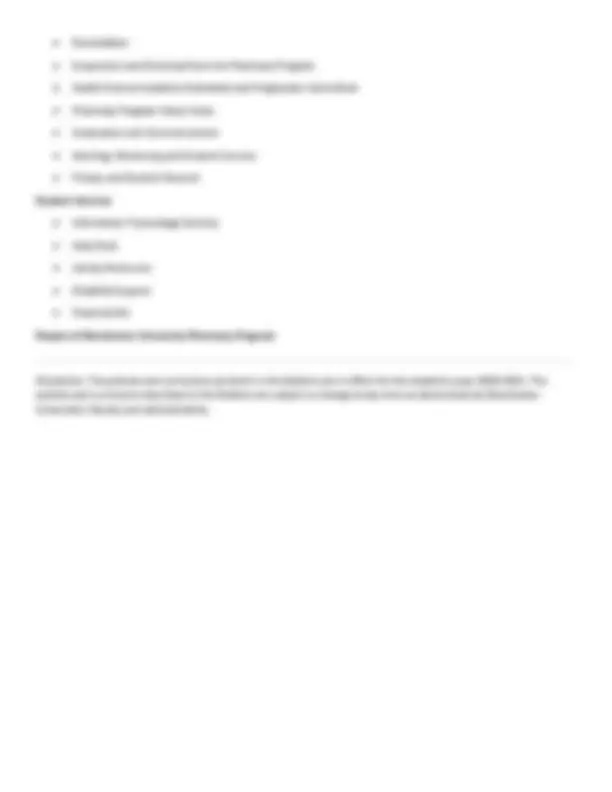
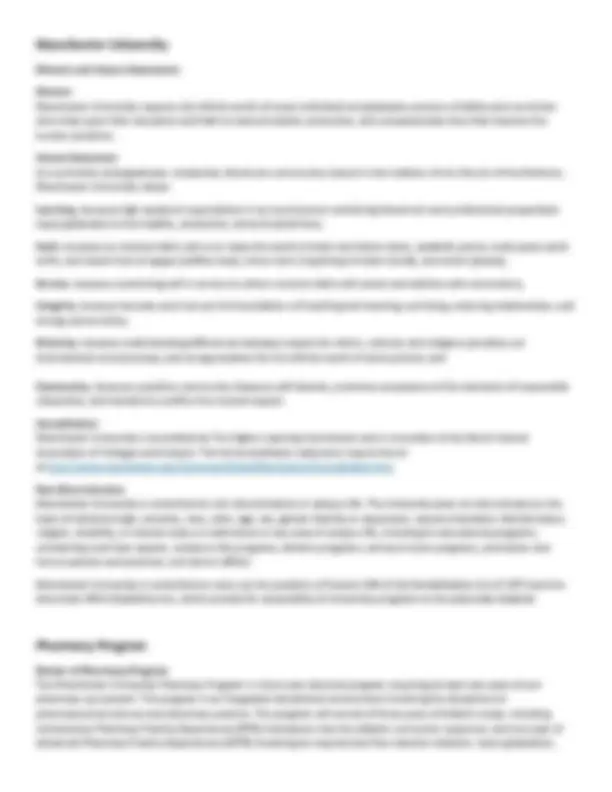
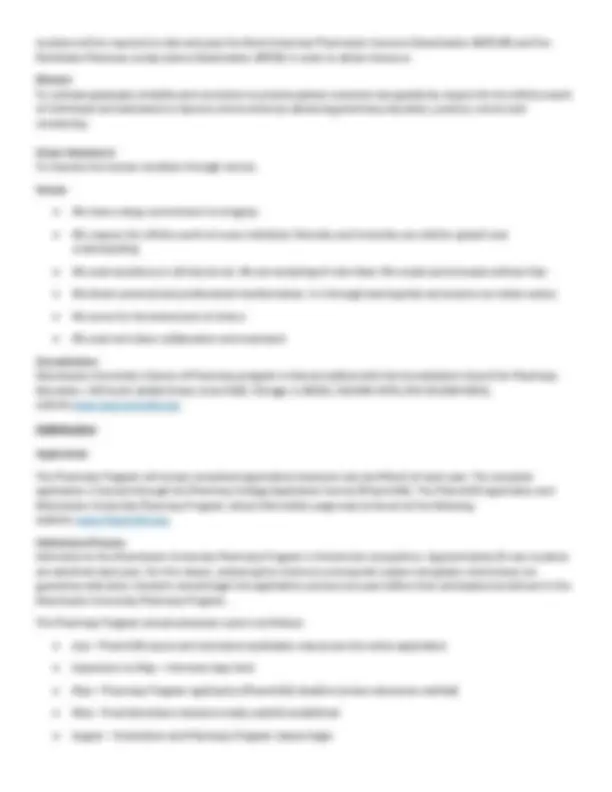
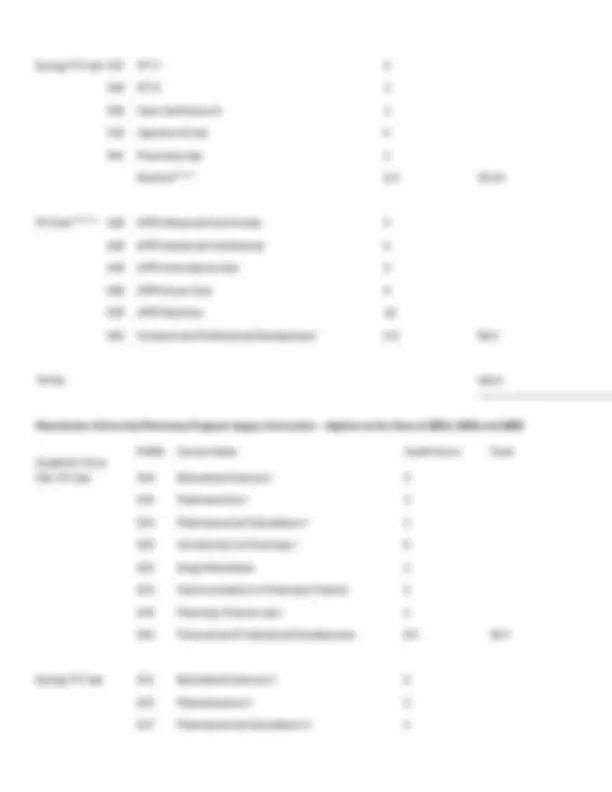
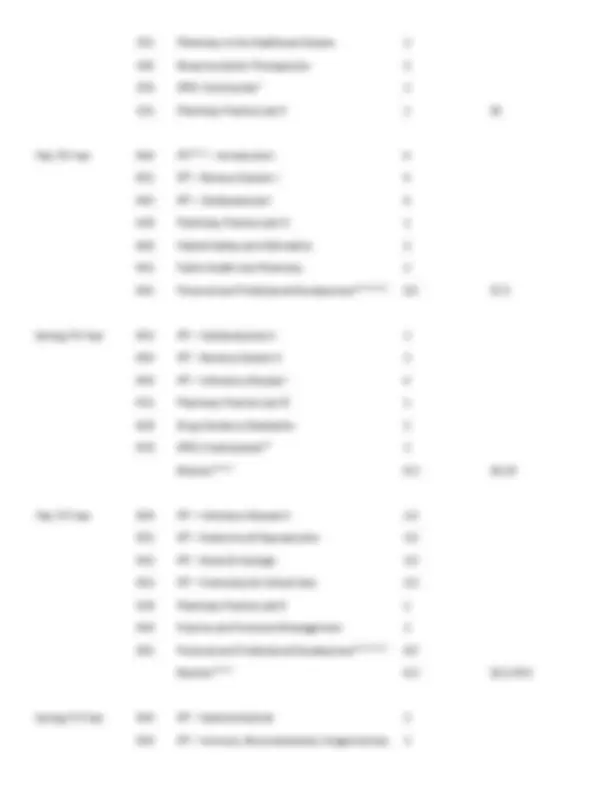
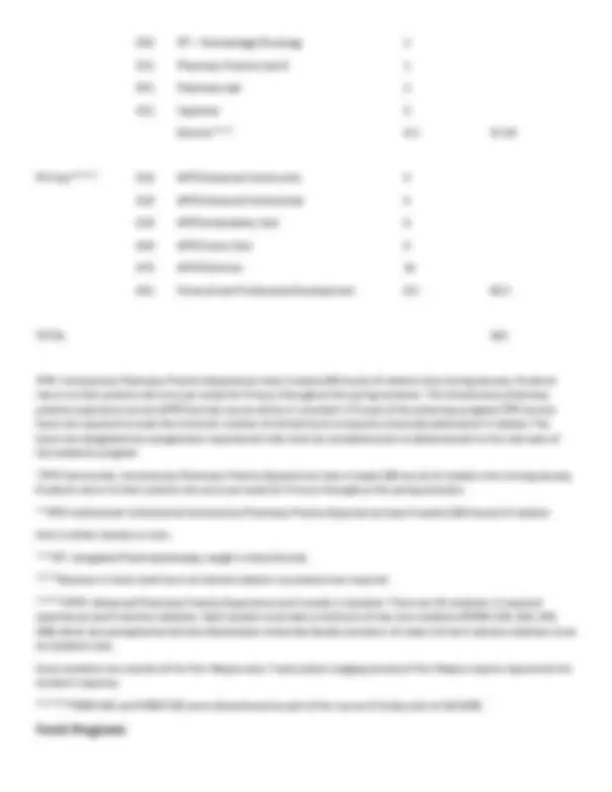
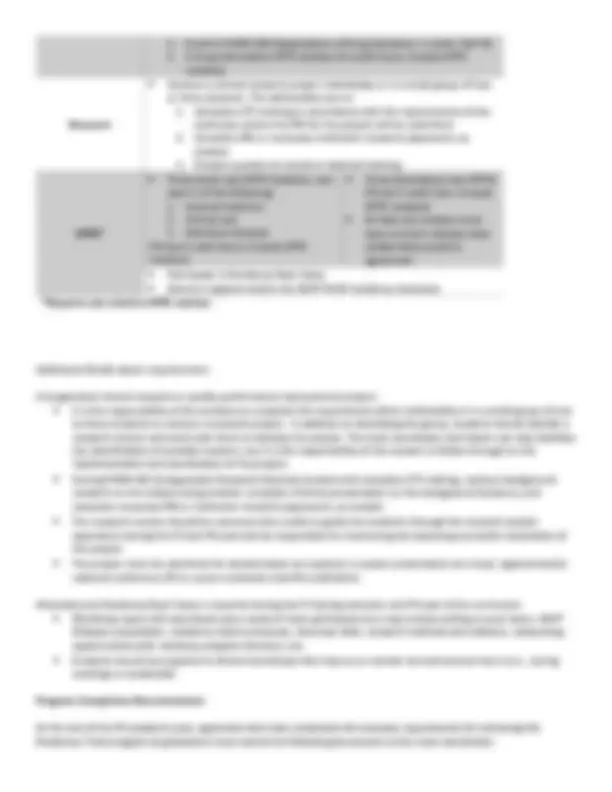
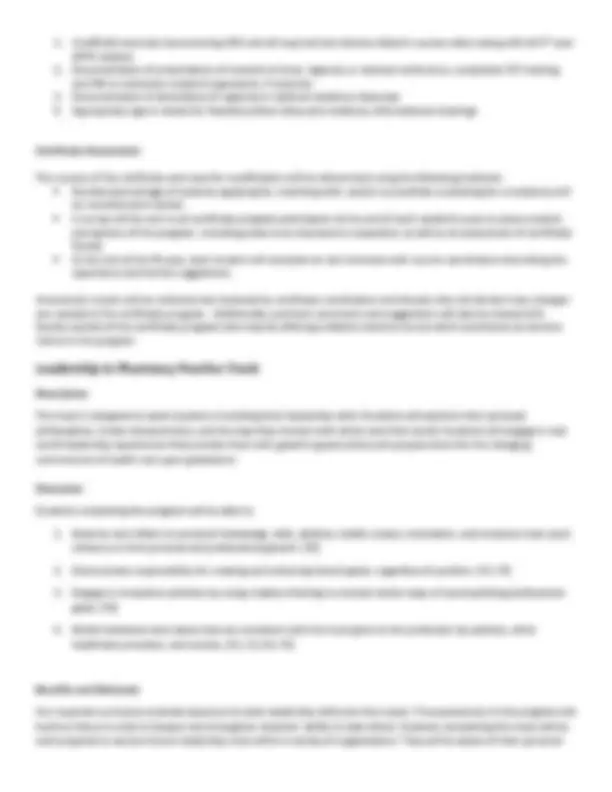
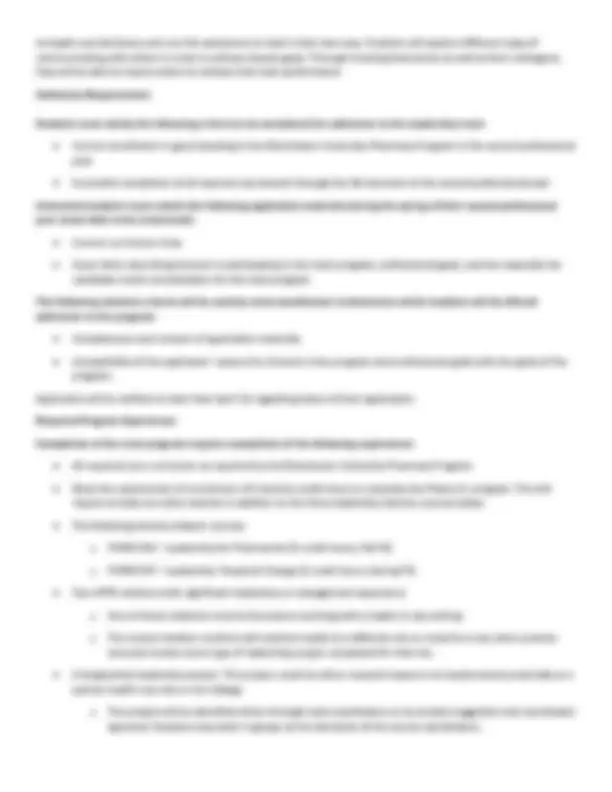
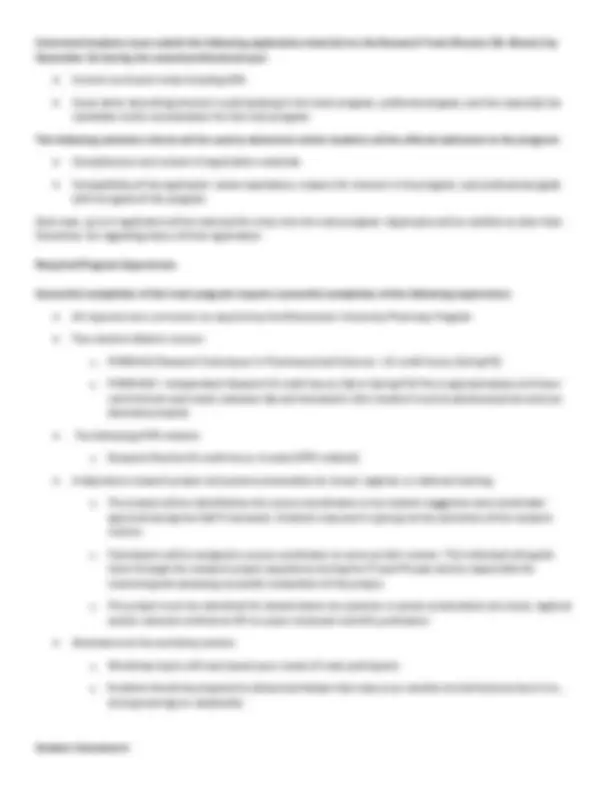
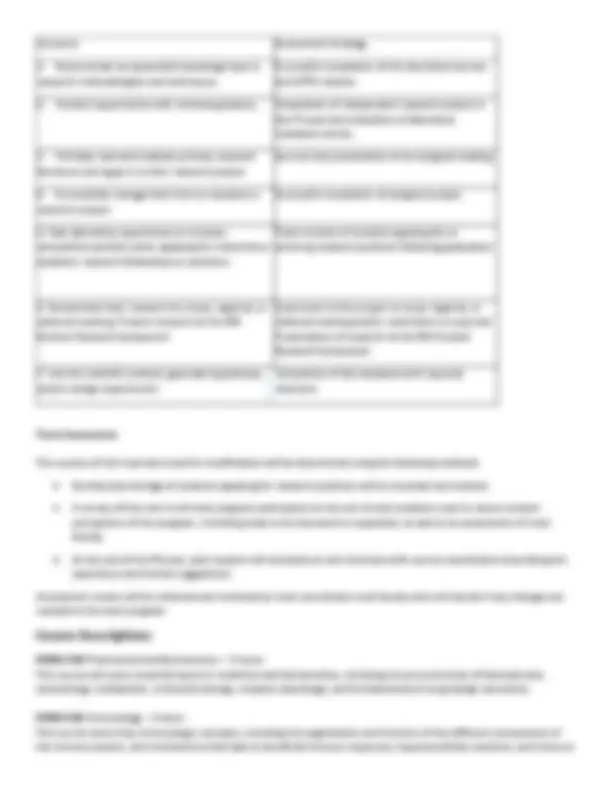
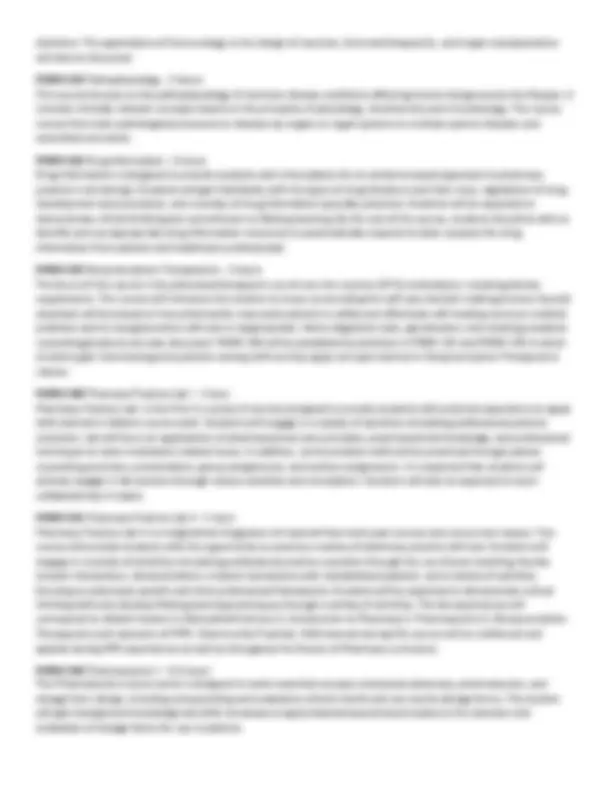
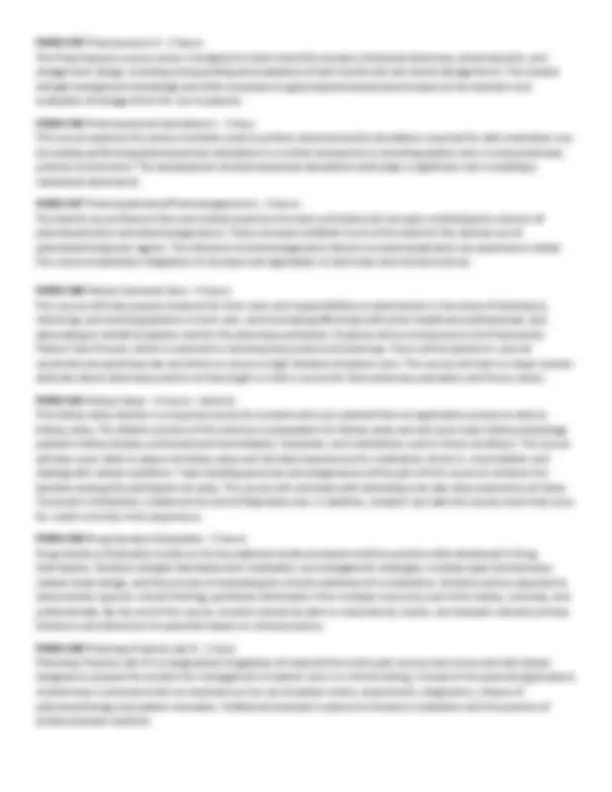
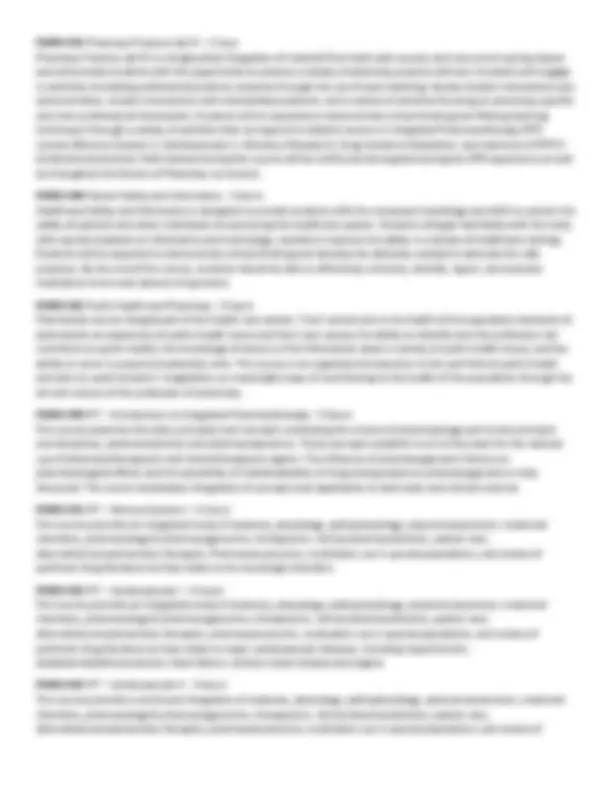
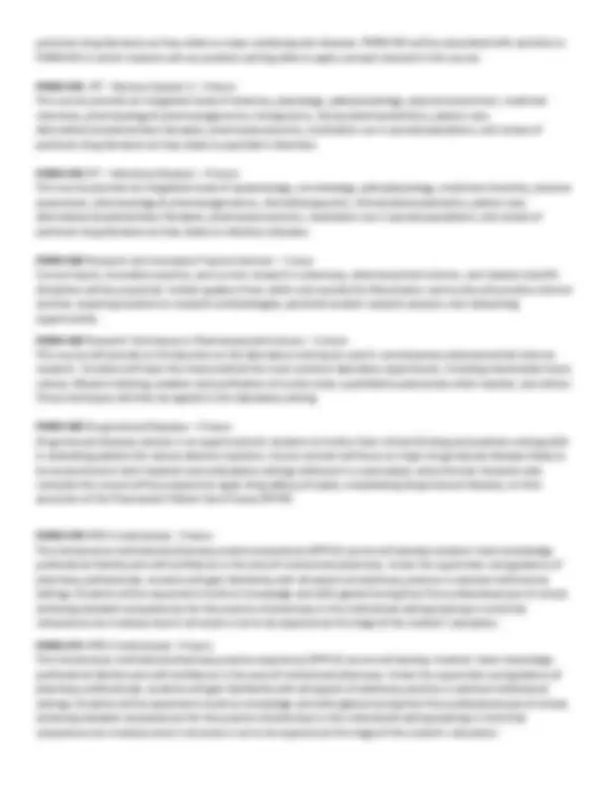
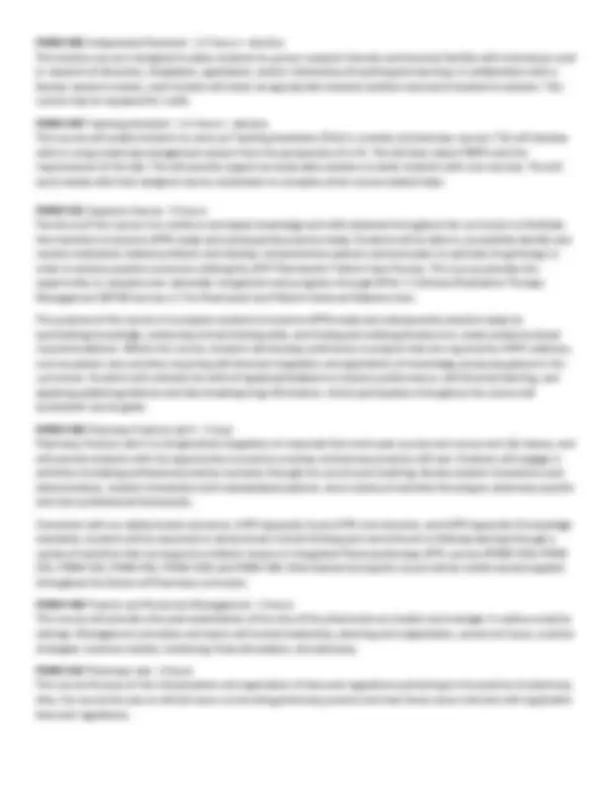
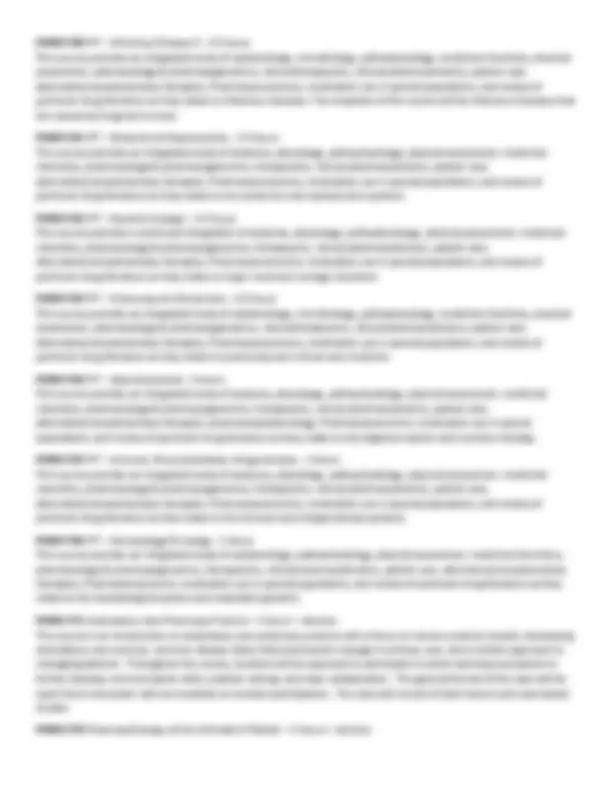
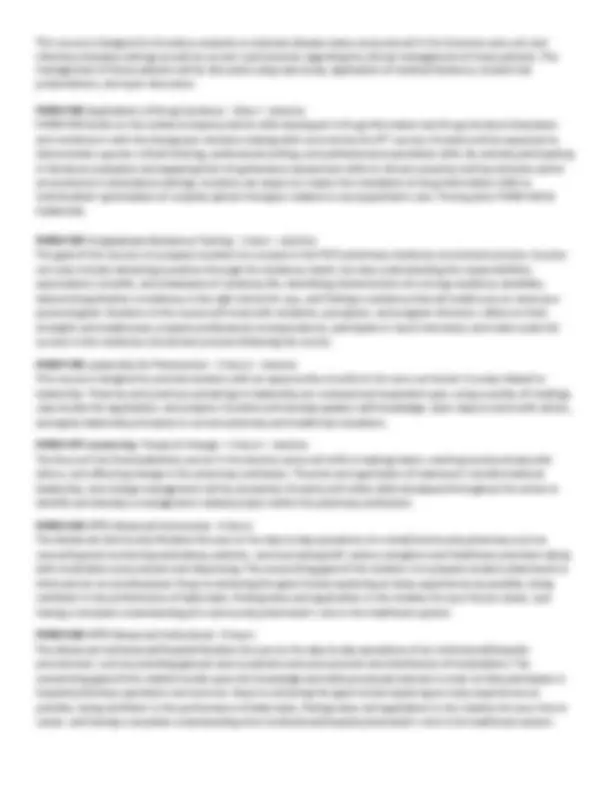
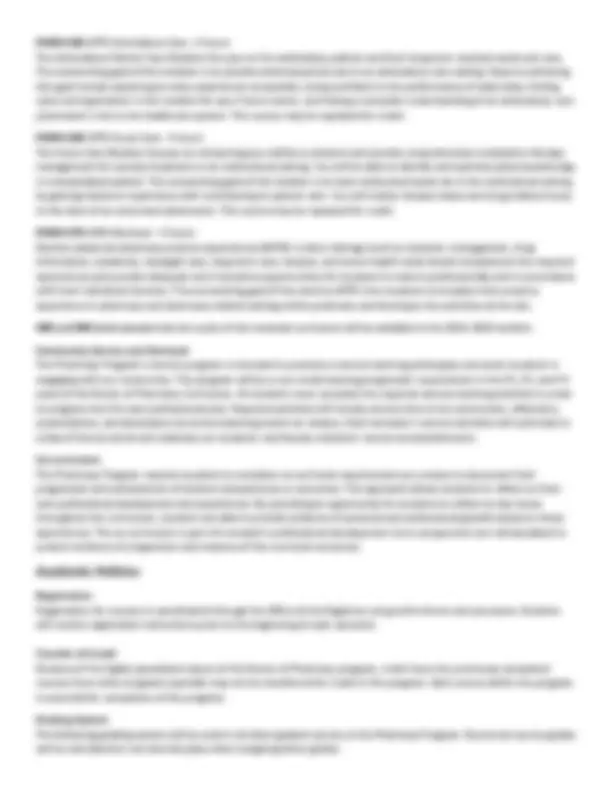
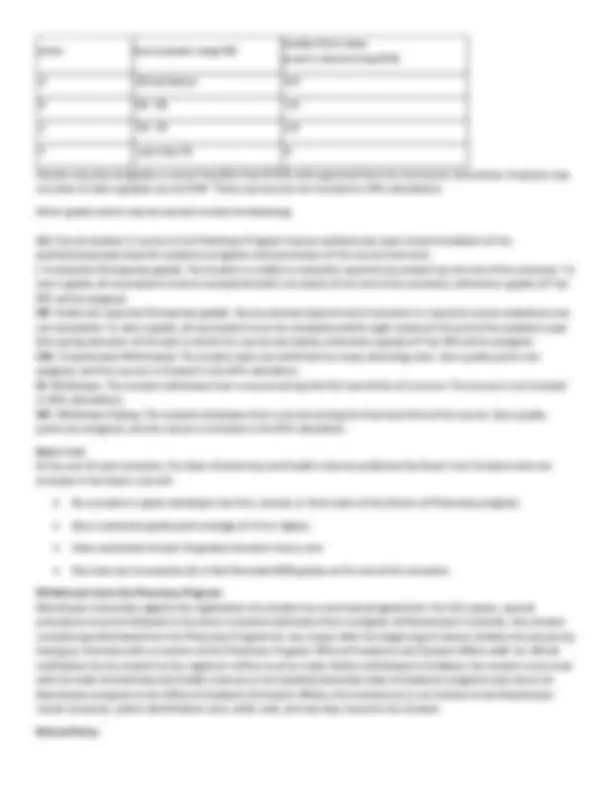
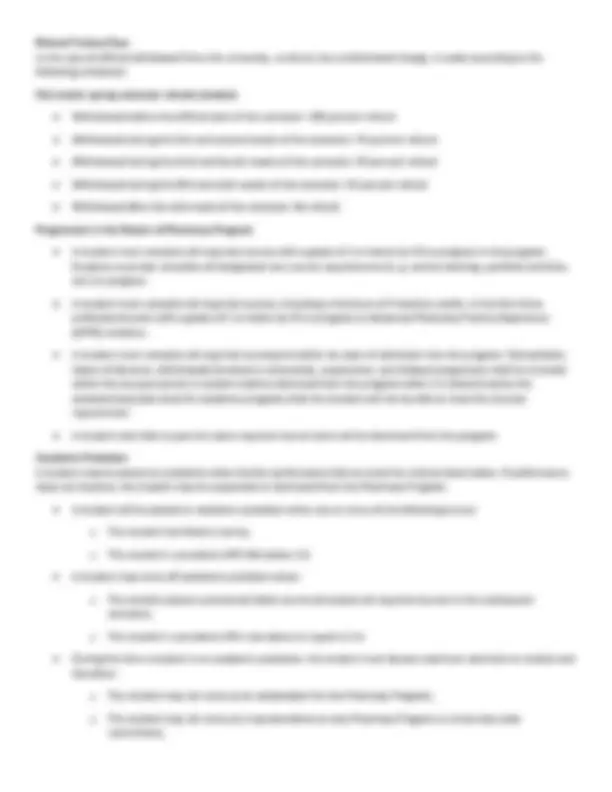
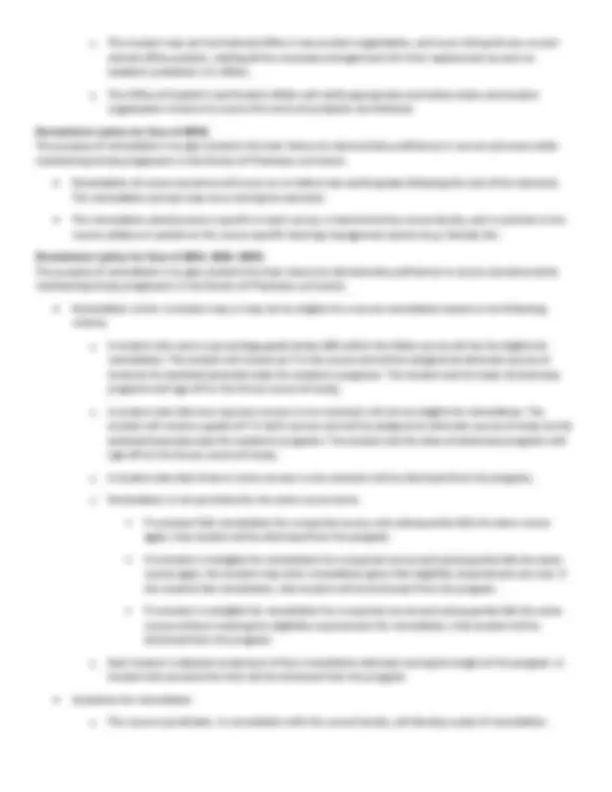
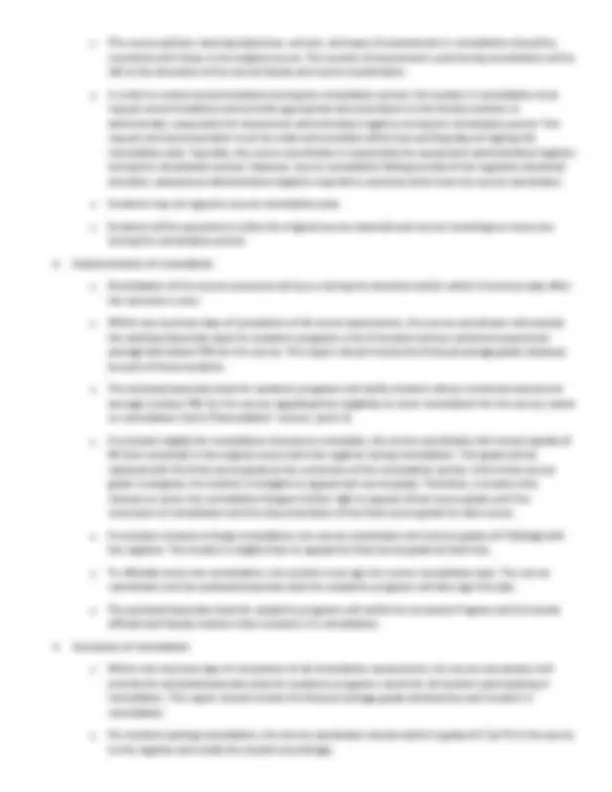
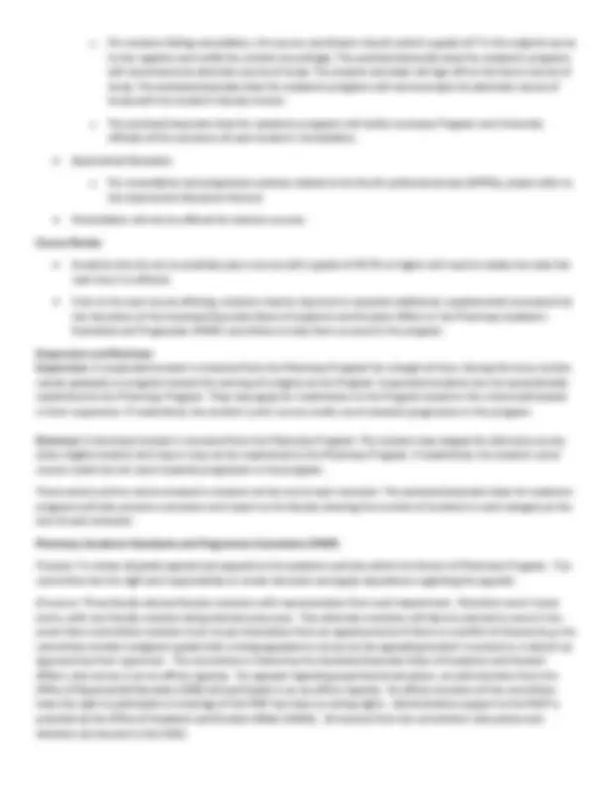
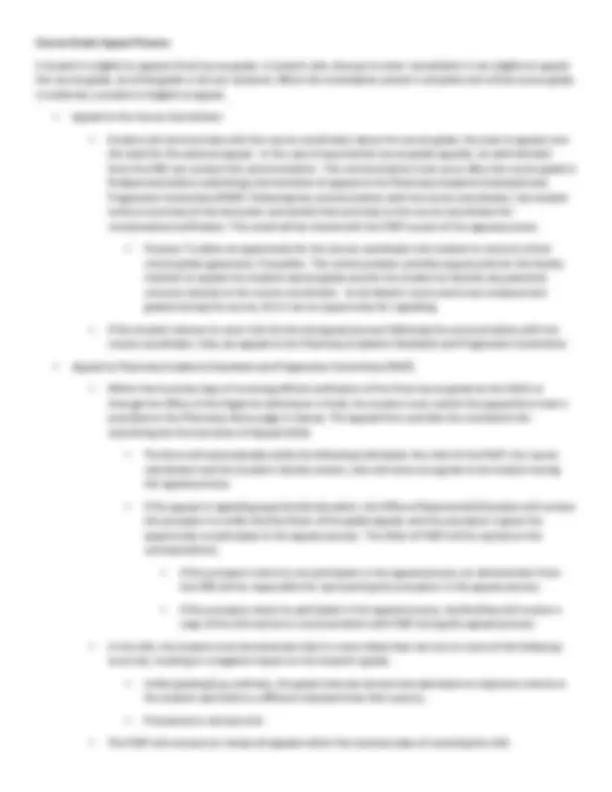
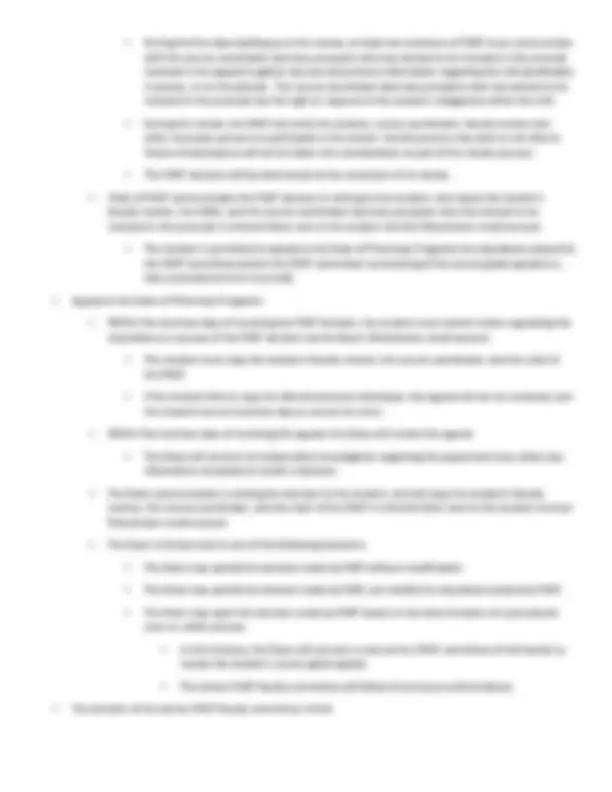
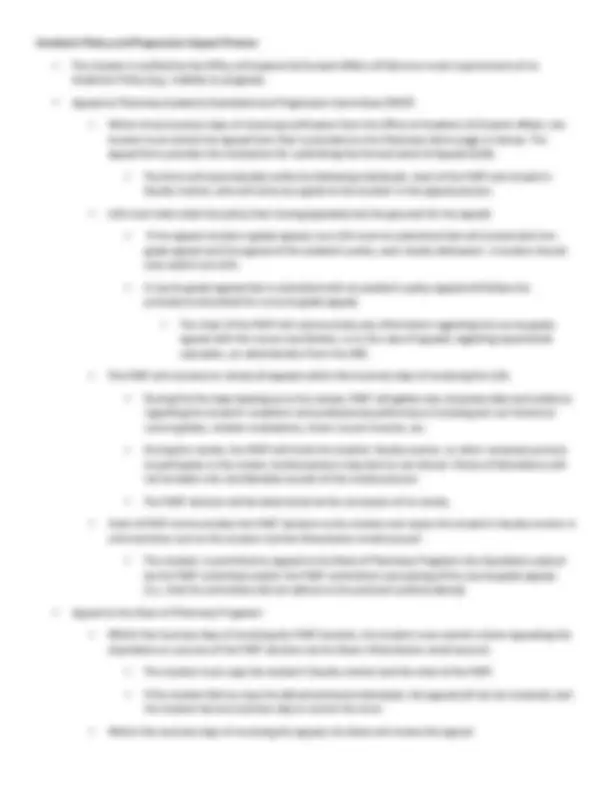
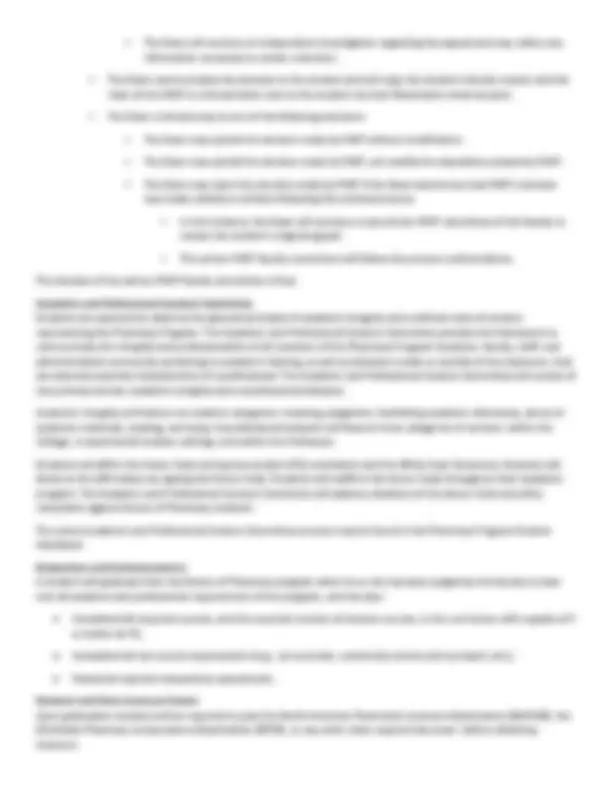
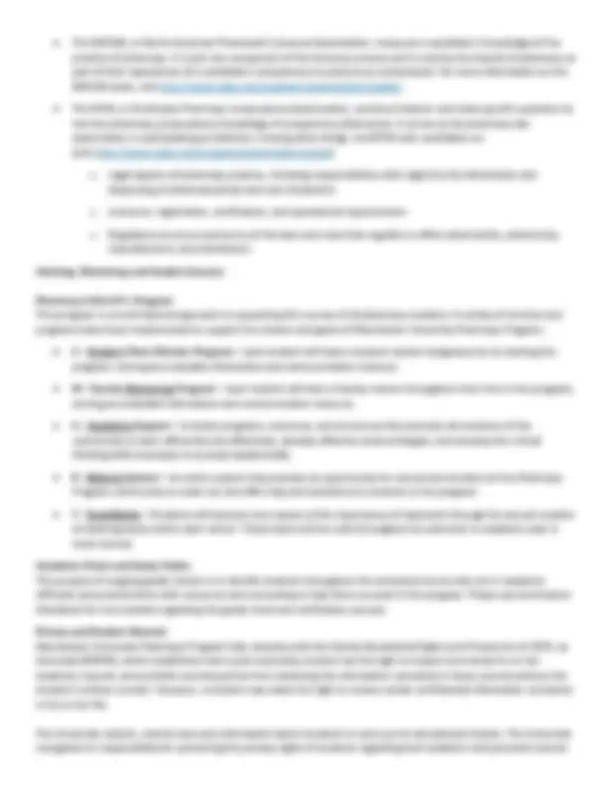
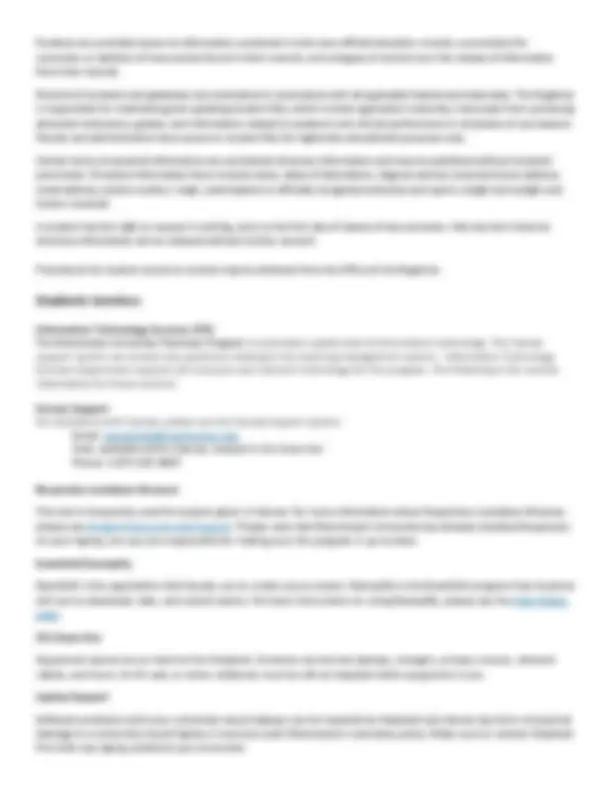
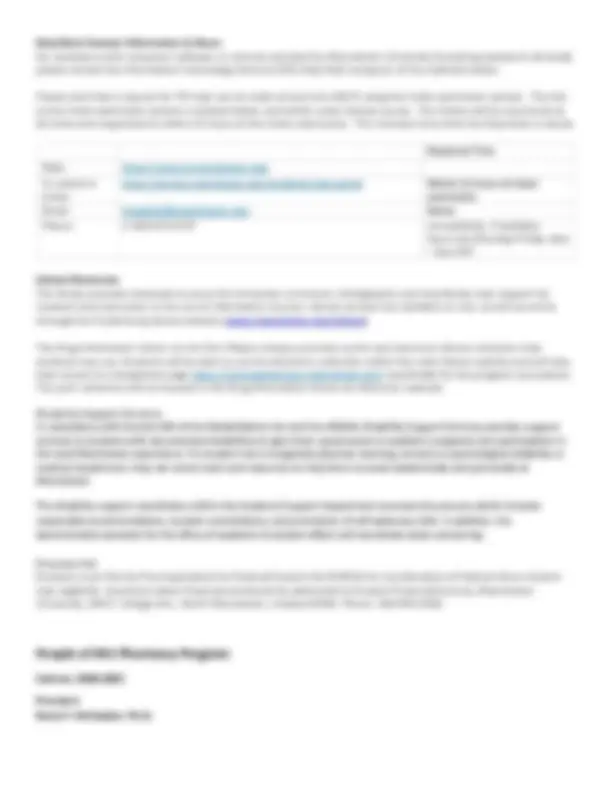
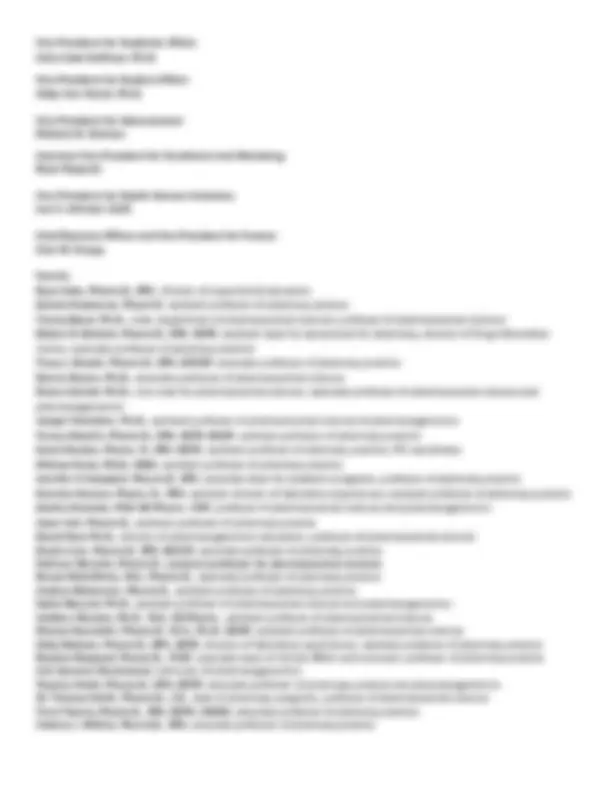
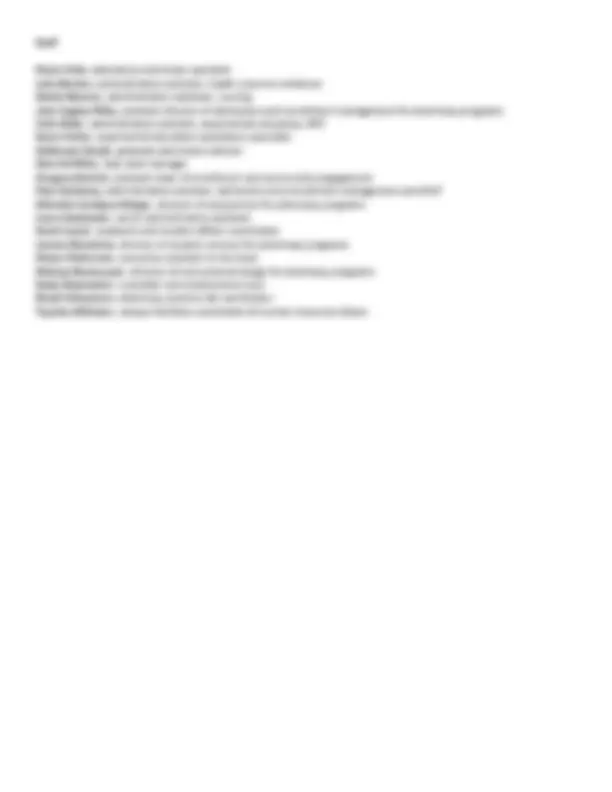


Study with the several resources on Docsity

Earn points by helping other students or get them with a premium plan


Prepare for your exams
Study with the several resources on Docsity

Earn points to download
Earn points by helping other students or get them with a premium plan
Community
Ask the community for help and clear up your study doubts
Discover the best universities in your country according to Docsity users
Free resources
Download our free guides on studying techniques, anxiety management strategies, and thesis advice from Docsity tutors
The curriculum for the Manchester University Pharmacy Program, including courses in Immunology, Pharmacokinetics, and Pharmacy Practice. Students will engage in a variety of activities simulating professional practice scenarios and gain familiarity with all aspects of pharmacy practice in selected institutional settings. Notable courses include Pharmacy Practice Lab IV, Pharmacy Practice Lab V, and Ambulatory Care Pharmacy Practice, which is an elective. The document also mentions the IPPE Service course, which is required to meet the minimum number of clinical hours to become a licensed pharmacist in Indiana.
What you will learn
Typology: Study notes
1 / 41

This page cannot be seen from the preview
Don't miss anything!


































Manchester University
Pharmacy Program
Admission
Degree Requirements
Track Requirements
Academic Policies
Mission and Values Statements
Mission Manchester University respects the infinite worth of every individual and graduates persons of ability and conviction who draw upon their education and faith to lead principled, productive, and compassionate lives that improve the human condition.
Values Statement As a primarily undergraduate, residential, liberal arts community rooted in the tradition of the Church of the Brethren, Manchester University values:
Learning, because high academic expectations in an environment combining liberal arts and professional preparation equip graduates to live healthy, productive, and principled lives;
Faith, because our diverse faiths call us to make the world a kinder and better place, establish justice, build peace amid strife, and model lives of agape (selfless love), tikkun olam (repairing a broken world), and salam (peace);
Service, because committing self in service to others connects faith with action and abilities with convictions;
Integrity, because honesty and trust are the foundations of teaching and learning, enriching, enduring relationships, and strong communities;
Diversity, because understanding differences develops respect for ethnic, cultural, and religious pluralism; an international consciousness; and an appreciation for the infinite worth of every person; and
Community, because a positive community sharpens self-identity, promotes acceptance of the demands of responsible citizenship, and transforms conflict into mutual respect.
Accreditation Manchester University is accredited by The Higher Learning Commission and is a member of the North Central Association of Colleges and Schools. The full accreditation statement may be found at http://www.manchester.edu/Common/AboutManchester/Accreditation.htm.
Non-Discrimination Manchester University is committed to non-discrimination in campus life. The University does not discriminate on the basis of national origin, ancestry, race, color, age, sex, gender identity or expression, sexual orientation, familial status, religion, disability, or veteran status in admissions or any area of campus life, including its educational programs, scholarships and loan awards, residence life programs, athletic programs, extracurricular programs, promotion and tenure policies and practices, and alumni affairs.
Manchester University is committed to carry out the positions of Section 504 of the Rehabilitation Act of 1973 and the Americans With Disabilities Act, which provide for accessibility of University programs to the physically disabled.
Doctor of Pharmacy Program The Manchester University Pharmacy Program is a four-year doctoral program requiring at least two years of pre- pharmacy coursework. The program is an integrated educational environment involving the disciplines of pharmaceutical sciences and pharmacy practice. The program will consist of three years of didactic study, including Introductory Pharmacy Practice Experiences (IPPE) interwoven into the didactic curriculum sequence, and one year of Advanced Pharmacy Practice Experiences (APPE) involving six required and four elective rotations. Upon graduation,
students will be required to take and pass the North American Pharmacist Licensure Examination (NAPLEX) and the Multistate Pharmacy Jurisprudence Examination (MPJE) in order to obtain licensure.
Mission To cultivate graduates of ability and conviction to provide patient-centered care guided by respect for the infinite worth of individuals and dedicated to improve communities by advancing pharmacy education, practice, service and scholarship.
Vision Statement To improve the human condition through service.
Values
Accreditation Manchester University’s Doctor of Pharmacy program is fully accredited with the Accreditation Council for Pharmacy Education, 135 South LaSalle Street, Suite 4100, Chicago, IL 60503; 312/644-3575; FAX 312/664-4652; website www.acpe-accredit.org.
Application
The Pharmacy Program will accept completed applications between July and March of each year. The complete application is housed through the Pharmacy College Application Service (PharmCAS). The PharmCAS application and Manchester University Pharmacy Program school information page may be found at the following website: www.PharmCAS.org.
Admissions Process Admission to the Manchester University Pharmacy Program is limited and competitive. Approximately 65 new students are admitted each year. For this reason, achieving the minimum prerequisite subject and grade criteria does not guarantee admission. Students should begin the application process one year before their anticipated enrollment in the Manchester University Pharmacy Program.
The Pharmacy Program annual admission cycle is as follows:
Academic Term
556 IPT – Hematology/Oncology 3
531 Pharmacy Practice Lab VI 1
541 Pharmacy Law 2
521 Capstone 5
Elective**** 0 - 3 17 - 20
P4 Year***** 610 APPE Advanced Community 4
620 APPE Advanced Institutional 4
630 APPE Ambulatory Care 8
640 APPE Acute Care 8
670 APPE Electives 16
601 Personal and Professional Development 0.5 40.
IPPE: Introductory Pharmacy Practice Experiences have 2 weeks (80 hours) of rotation time during January. Students return to their practice site once per week for 4 hours throughout the spring semester. The introductory pharmacy practice experience service (IPPE Service) course will be in a student’s P3 year of the pharmacy program IPPE service hours are required to meet the minimum number of clinical hours to become a licensed pharmacist in Indiana. The hours are designated as a progression requirement that must be completed prior to advancement to the next year of the academic program.
*IPPE Community: Introductory Pharmacy Practice Experiences have 2 weeks (80 hours) of rotation time during January. Students return to their practice site once per week for 4 hours throughout the spring semester.
**IPPE Institutional: Institutional Introductory Pharmacy Practice Experiences have 4 weeks (160 hours) of rotation
time in either January or June.
***IPT: Integrated Pharmacotherapy, taught in block format.
****Electives: 5 total credit hours of elective didactic coursework are required.
*****APPE: Advanced Pharmacy Practice Experiences are 4 weeks in duration. There are 10 rotations: 6 required experiences and 4 elective rotations. Each student must take a minimum of two core rotations (PHRM 610, 620, 630,
Some rotations are outside of the Fort Wayne area. Travel and/or lodging outside of Fort Wayne may be required at the student’s expense.
******PHRM 401 and PHRM 501 were discontinued as part of the course of study prior to fall 2020.
Track Programs Manchester University Pharmacy Program combines a set of courses and experiences through which students develop advanced competency in a specific area. These specialized tracks allow students to demonstrate to a potential employer or post-graduate training program that they have skill and experience beyond the expectation of a Pharm.D. graduate.
Track programs offered:
Certificate Description
The Residency Track is designed to give motivated students the opportunity to expand their knowledge and skills related to the direct patient care. This track program will provide two options for patient care focus – acute care and ambulatory care - and it is up to the student to decide which one to pursue. It is intended to reinforce, build upon, and expand the application of topics covered throughout the required Doctor of Pharmacy curriculum at Manchester University College of Pharmacy. The goal of the program is for participants to obtain and excel in a postgraduate year 1 (PGY1) pharmacy residency and beyond.
Track Leadership
Track Director Robert D. Beckett, PharmD, BCPS Associate Professor of Pharmacy Practice Email: rdbeckett@manchester.edu
Acute Care Focus Coordinator Ambulatory Care Focus Coordinator Dusty Linn, PharmD, BCCCP Associate Professor of Pharmacy Practice Email: ddlinn@manchester.edu
Andrea Mekonnen, PharmD, BCACP Assistant Professor of Pharmacy Practice Email: awhitaker@manchester.edu
The track director will coordinate the application process, verify satisfactory completion of the program, and directs the residency boot camp. The coordinators will assist students with meeting requirements of the program, track students’ progress in meeting requirements for the track program, and assist the director, as needed.
Track Outcomes
Students participating in the certificate program will be able to:
Benefits and Rationale
Students completing the certificate can expect to benefit by 1) expanding their knowledge base in topics in acute care or ambulatory care related topics 2) expanding their critical thinking skills 3) developing their clinical skills, and 4) refining
Research
Additional Details about requirements:
A longitudinal clinical research or quality performance improvement project.
Attendance at Residency Boot Camp is required during the P3 Spring semester and P4 year of the curriculum.
Program Completion Documentation
At the end of the P4 academic year, applicants who have completed all necessary requirements for achieving the Residency Track program at graduation must submit the following documents to the track coordinator:
Certificate Assessment
The success of the certificate and need for modification will be determined using the following methods:
Assessment results will be collected and reviewed by certificate coordinators and faculty who will decide if any changes are needed to the certificate program. Additionally, pertinent comments and suggestions will also be shared with faculty outside of the certificate program who may be offering a didactic elective course which constitutes an elective choice in the program.
Description
This track is designed to assist students in building their leadership skills. Students will examine their personal philosophies, innate characteristics, and the way they interact with others and their world. Students will engage in real world leadership experiences that provide them with growth opportunities and prepare them for the changing environment of health care upon graduation.
Outcomes
Students completing the program will be able to:
Benefits and Rationale
Our required curriculum provides exposure to basic leadership skills over four years. The experiences in this program will build on those in order to deepen and strengthen students’ ability to lead others. Students completing this track will be well prepared to assume future leadership roles within a variety of organizations. They will be aware of their personal
o Participants will be assigned a track course faculty member to serve as their mentor. This individual will guide them through the research project experience and be responsible for mentoring and assessing successful completion of the project.
o The project must be submitted for either:
dissemination as a podium or poster presentation at a local, regional and/or national conference or a peer-reviewed scientific publication; OR
consideration for implementation in an organization the student has worked with during his or her time in the track program.
These events could be College-sponsored workshops, community events, a session at a professional organization conference, or some other event. At least one of the sessions should be focused on a leadership-related topic. These events may be identified by either the track faculty or the student; however, they must be pre-approved by the track faculty. Students should be prepared to attend sessions that may occur outside normal business hours (i.e., during evenings or weekends).
Student Assessment
Track Assessment
The success of the track and need for modification will be determined using the following methods:
Track Outcome Assessment Strategy
Examine and reflect on personal knowledge, skills, abilities, beliefs, biases, motivation, and emotions that could enhance or limit personal and professional growth.
Maintenance of a leadership journal and participation in required didactic classes.
Demonstrate responsibility for creating and achieving shared goals, regardless of position.
Successful completion of the leadership/management APPE elective rotations.
Engage in innovative activities by using creative^ Completion of a leadership project with real world value. thinking to envision better ways of accomplishing professional goals.
Exhibit behaviors and values that are consistent with the trust given to the profession by patients, other healthcare providers, and society.
Self-reflections and evaluations on required experiences.
Assessment results will be collected and reviewed by track coordinators and faculty who will decide if any changes are needed to the track program. Additionally, pertinent comments and suggestions will also be shared with faculty outside of the track program who may be offering a didactic elective course which constitutes an elective choice in the program.
Description
The pharmaceutical sciences laboratory research track is designed to give motivated students the opportunity to expand their laboratory knowledge and/or research skills. It is intended to expose students to the types of laboratory research that could be done as a PharmD and to improve critical thinking and problem-solving ability.
Outcomes
Students participating in the track will be able to:
Benefits and Rationale
Students participating in the track will 1) conduct independent experiments 2) improve critical thinking 3) analyze research literature 4) master laboratory techniques and 5) effectively manage their time. Their track is primarily intended for students with significant interest in completing post-graduate research fellowships or in obtaining industrial research positions. The track program will be comprised of four main components:
This program is designed to provide track participants with the necessary guidance, experiences, and core knowledge to obtain and succeed in a laboratory research position.
Admission Requirements
Students must satisfy the following criteria to be considered for admission to the track:
Outcome Assessment Strategy
Successful completion of the described courses and APPE rotation
Journal club presentation of an assigned reading.
Successful completion of assigned project.
Track number of students applying for or entering research positions following graduation.
Submission of the project to local, regional, or national meeting and/or submission to a journal. Presentation of research at the NM Student Research Symposium
Completion of lab notebook with required elements.
Track Assessment
The success of the track and need for modification will be determined using the following methods:
Assessment results will be collected and reviewed by track coordinators and faculty who will decide if any changes are needed to the track program.
PHRM 310 Pharmaceutical Biochemistry I - 5 hours This course will cover essential topics in medicinal and biochemistry, including structure-function of biomolecules, enzymology, metabolism, molecular biology, receptor physiology, and fundamentals of drug design and action.
PHRM 318 Immunology - 2 hours This course covers key immunologic concepts, including the organization and function of the different components of the immune system, and mechanisms that lead to beneficial immune responses, hypersensitivity reactions, and immune
disorders. The applications of immunology in the design of vaccines, immunotherapeutics, and organ transplantation will also be discussed.
PHRM 319 Pathophysiology - 3 hours This course focuses on the pathophysiology of common disease conditions affecting human beings across the lifespan. It includes clinically relevant concepts based on the principles of physiology, biochemistry and microbiology. The course moves from basic pathological processes to diseases by organs or organ systems to multiple system diseases and associated processes.
PHRM 322 Drug Information - 2 hours Drug Information is designed to provide students with a foundation for an evidence-based approach to pharmacy practice in all settings. Students will gain familiarity with the types of drug literature and their uses, regulations of drug development and promotion, and a variety of drug information specialty practices. Students will be expected to demonstrate critical thinking and commitment to lifelong learning. By the end of the course, students should be able to identify and use appropriate drug information resources to systematically respond to basic requests for drug information from patients and healthcare professionals.
PHRM 325 Nonprescription Therapeutics - 3 hours The focus of this course is the pharmacotherapeutic use of over the counter (OTC) medications, including dietary supplements. The course will introduce the student to issues surrounding the self-care decision making process. Special emphasis will be placed on how pharmacists may assist patients in safely and effectively self-treating common medical problems and to recognize when self-care is inappropriate. Home diagnostic tests, glucometers, and smoking cessation counseling/products are also discussed. PHRM 324 will be paralleled by activities in PHRM 331 and PHRM 370 in which students gain interviewing and problem-solving skills as they apply concepts learned in Nonprescription Therapeutics classes.
PHRM 330 Pharmacy Practice Lab I - 1 hour Pharmacy Practice Lab I is the first in a series of courses designed to provide students with practical experience to apply skills learned in didactic course work. Students will engage in a variety of activities simulating professional practice scenarios. Lab will focus on applications of pharmaceutical care principles, pharmaceutical knowledge, and professional techniques to solve medication-related issues. In addition, communication skills will be practiced through patient counseling exercises, presentations, group assignments, and written assignments. It is expected that students will actively engage in lab sessions through various activities and simulations. Students will also be expected to work collaboratively in teams.
PHRM 331 Pharmacy Practice Lab II – 1 hour Pharmacy Practice Lab II is a longitudinal integration of material from both past courses and concurrent classes. This course will provide students with the opportunity to practice a variety of pharmacy practice skill sets. Students will engage in a variety of activities simulating professional practice scenarios through the use of peer-teaching, faculty- student interactions, demonstrations, student interactions with standardized patients, and a variety of activities focusing on pharmacy-specific and inter-professional frameworks. Students will be expected to demonstrate critical thinking skills and develop lifelong learning techniques through a variety of activities. The lab experiences will correspond to didactic lessons in Biomedical Sciences II, Introduction to Pharmacy II, Pharmaceutics II, Nonprescription Therapeutics and elements of IPPE I (Community Practice). Skills learned during this course will be reinforced and applied during IPPE experiences as well as throughout the Doctor of Pharmacy curriculum.
PHRM 334 Pharmaceutics I – 2.5 hours The Pharmaceutics course series is designed to teach essential concepts of physical pharmacy, pharmaceutics, and dosage form design, including compounding and evaluation of both sterile and non-sterile dosage forms. The student will gain background knowledge and skills necessary to apply biopharmaceutical principles to the selection and evaluation of dosage forms for use in patients.